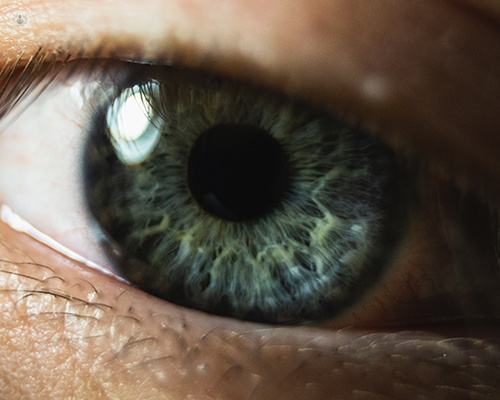Is a multifocal lens implant the right lens for you?
Written by:Deciding which lens implant is best for you is an important decision that requires specialist guidance.
Mr Alexander Ionides is a specialist in lens implants and has helped countless patients with their vision. He provides you with a guide to get you started on making a well-informed decision regarding if multifocal lenses are the right option for fulfilling your personal needs.

How long do our natural lenses last?
The natural lens focuses on near and distance vision by altering its shape, but by the time we humans are 45 years old, the lens starts to stop focussing on near vision and most of us will start to need reading glasses. This is part of the normal human ageing process.
When do people need a lens implant?
At the time of cataract surgery, the cloudy lens (called a cataract) is removed and a clear new plastic lens is put in the place of the old, cloudy lens.
If you need a lens implant due to cataract surgery or age-related vision deterioration, your options will be a monofocal lens or multifocal lens.
When is a monofocal lens best?
The new plastic lens used in cataract surgery is called a lens implant and is usually a monofocal lens. “Monofocal” means that the lens only focuses on one distance.
A monofocal lens is used to make the vision good for seeing at a distance. The person receiving it will need reading glasses for close work. Monofocal lenses give the best quality of vision as they only have one 'job' to do and that is to give good distance vision (a few people prefer the monofocal lens to make them short-sighted, but then they will need glasses for distance). Some people want to be free of glasses altogether, both for distance and for reading. This is trickier.
When is a multifocal lens best?
Multifocal lenses aim to focus both for distance and near vision (and also for intermediate 'computer' distance). They are made of plastic, usually acrylic, and so they cannot change their shape to focus like the natural lens can in early life. Therefore, there are different designs to achieve this.
Multiple rings on the surface of the lens
One common design is to create multiple rings on the surface of the lens, rather like the circles on an archery target, and these circles focus on near and intermediate as well as the lens focussing for distance. This helps people to not need reading glasses for close work or for reading on a desktop computer.
Having said that, some people still find that they read better and clearer with some simple +1.50 reading glasses, despite having multifocal lens implants. So, it is wrong to expect too much of the multifocal lenses.
Also, some people find that the rings on the lens give them halos around lights at night and this can make driving and generally walking around very distracting. Furthermore, a minority of patients find that despite achieving visual acuities of 6/6 (or as the Americans call it, 20/20 vision), they can complain that the quality of the vision is not as clear nor as sharp as they remember it being.
Graduated reading part of the lens
Another popular design is to have a lens implant that has a graduated reading part of the lens rather than rings on the lens. With this design, a low reading add of +1.50 can give a better quality of vision if not giving a full reading ability, such that reading glasses for small print or prolonged reading will be needed.
So, multifocal lens implants do not suit everyone.
Who are multifocal lenses most suitable for?
Perhaps as much as one in ten patients find they are not happy with the quality of their vision with multifocal lens implants and removing them means more surgery, which is not advised in many instances owing to the risk of complications.
But, many people are very happy with the visual outcomes and are not bothered by the halos or the quality of the vision. There is no sure way of predicting who will be happy and who will not. It has been suggested that personalities with a strong commitment to quality and detail and a dislike of compromise may not be the ideal candidates! Those who have visually demanding lifestyles and lots of night driving may also not be ideal candidates.
Multifocal lenses aim to give good quality vision for distance, intermediate and near vision. For some people, this is achieved but the degradation to the quality of vision is for some people, unacceptable. This is a science that is still being developed and the perfect lens has yet to be invented.
Do you have concerns about the best method of optimising your vision? Mr Alexander Ionides can help you with specialist guidance.


